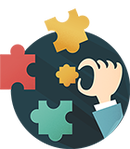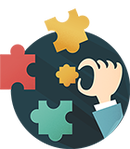library learning commons certification portfolio guidelines
|
Schools pursuing Library Learning Commons Certification should submit a portfolio that includes all of the elements described below. Portfolios may be submitted as a visual portfolio, such as a website.
The initial portfolio submission will be reviewed by a small number of Library Learning Commons Advisory Board members who will provide initial feedback for the school to consider. Once needed revisions have been made, Library Learning Commons Advisory Board members will schedule a 1-hour school visit. School visits are designed to provide an intimate look at your school library media program in action. Library media specialists provide LLC Advisory Board members with an "academic tour" of their space, highlighting intentional spaces, collaborative areas, student engagement, and academic impact. Use the portfolio guidelines below to construct your portfolio as you tell the story of your journey from a media center to a library learning commons. If you have questions, please reach out to Library Media Education Supervisor, Holly Frilot. |
background information
The Library Learning Commons is an engaging and flexible learning environment designed for our students as digital learners. Collaborative teaching and learning are the heart of this transformation, and inform the design of both the library media program and the space.
Cobb schools can earn Library Learning Commons Certification through examining the three specific areas of Library Learning Commons transformation: services, resources, and intentional spaces.
Principals and library media specialists will create a portfolio according to the guidelines below and includes evidence of Library Learning Commons philosophy and practice. Submissions will be evaluated by the Library Learning Commons Advisory Board, which consists of CCSD staff and community representatives.
Through this process, schools are poised to apply for the state of Georgia Judy Serritella Exemplary Library Media Program Award and the National School Library Media Program of the Year Award.
A Library Learning Commons:
Sources
Loertscher, David V., and Carol Koechlin. "Climbing to excellence: Defining characteristics of successful learning commons." Knowledge Quest 42.4 (2014): E1.
Pressley, Lauren. "Charting a Clear Course: A State of the Learning Commons." ACRL. N.p., 22 Mar. 2017. Web. 9 July 2017. Link.
Cobb schools can earn Library Learning Commons Certification through examining the three specific areas of Library Learning Commons transformation: services, resources, and intentional spaces.
Principals and library media specialists will create a portfolio according to the guidelines below and includes evidence of Library Learning Commons philosophy and practice. Submissions will be evaluated by the Library Learning Commons Advisory Board, which consists of CCSD staff and community representatives.
Through this process, schools are poised to apply for the state of Georgia Judy Serritella Exemplary Library Media Program Award and the National School Library Media Program of the Year Award.
A Library Learning Commons:
- Represents a philosophy of flexible learning in programming and design, centers on collaboration, encourages innovation, and incorporates the unique culture of the local school community.
- Is student-centered and provides informational resources, productivity tools, and services to support and accelerate student learning (Pressley, 112).
- Continues to support teaching and learning, but also provides space for “experimenting, playing, making, doing, thinking, collaborating, and growing” (Loertscher, E3).
- Includes instructional leadership and collaborative work of the Library Media Specialist (LMS), allowing students to learn digital literacy skills, engage in creative thinking, and prepare for their futures.
- Functions on a flexible schedule, rather than fixed, at least 75% of the school day.
Sources
Loertscher, David V., and Carol Koechlin. "Climbing to excellence: Defining characteristics of successful learning commons." Knowledge Quest 42.4 (2014): E1.
Pressley, Lauren. "Charting a Clear Course: A State of the Learning Commons." ACRL. N.p., 22 Mar. 2017. Web. 9 July 2017. Link.
part I: school context
- School name and location
- Principal's name
- Library Media Specialist name(s)
- Number of students
- Number of teachers
- Number of books circulated each year for the last three years
- Number of Cobb Digital Library logins each year for the last three years
- Number of class visits to your media center each year for the last three years
- Provide any additional school demographics or library program data that helps provide the LLC Advisory Board with a better understanding if your school and/or library program (optional). Update: Include a discussion of how your Library Learning Commons program adapted during changing pandemic times.
part II: services
A Learning Commons can provide many and varied services to support instructional goals and student engagement. Below are topics that can be included in your response, but you are not limited to these. Library Learning Commons Advisory Board members are looking for a minimum of 5 quality examples.
Describe the services provided in your Library Learning Commons. How do they represent the Library Learning Commons philosophy and your school's learning culture?
- Instructional partnerships and leadership
- Collaborating with teachers across grade levels and subject areas
- Collaborating with teachers about STEM challenges
- Promoting a culture of reading
- Promoting a culture of inquiry, creativity, and innovation
- Providing large group instruction in effective practices for research, using the Cobb Digital Library, creating products through digital tools, and using productivity resources to support instructional standards and/or STEM
- Collaborating with staff to work toward school program goals, such as Humanities in Practice, Arts Integration, Career Academies, etc.
- Providing ongoing support to classes and individual students throughout short and long term assignments
- Individual and small group technology and/or production support
- Professional learning (individual, small group, or large group)
Describe the services provided in your Library Learning Commons. How do they represent the Library Learning Commons philosophy and your school's learning culture?
part III: Resources
A Library Learning Commons continues to provide print and digital resources while also supplying new and innovative resources designed to stimulate critical thinking and creativity. Below are examples of resources that can be included in your response, but you are not limited to these. Library Learning Commons Advisory Board members are looking for a minimum of 5 quality examples.
Describe the information and technology resources that are provided in your Library Learning Commons. How do they represent the Library Learning Commons philosophy and support your school's learning culture?
- Print and digital reference resources (including and in addition to the Cobb Digital Library)
- STEM instructional resources and productivity tools
- Resources to support school program goals, such as Arts Integration or Career Academies
- Genrefication of the print collection
- Easily accessible technology (desktops, laptops, tablets) available in the Learning Commons.
- Video production resources available for students to use throughout the instructional day (green screen, cameras, apps, etc.)
- Additional creative tools and innovative resources (Legos, Robotics, Coding, Circuits, 3D printer, etc.)
Describe the information and technology resources that are provided in your Library Learning Commons. How do they represent the Library Learning Commons philosophy and support your school's learning culture?
part Iv: intentional spaces
A Library Learning Commons should be designed with intentional spaces, meaning that all areas have a designated and useful purpose for the school's instructional goals and culture while still allowing for flexibility. Below are examples that can be included in your response, but you are not limited to these. Library Learning Commons Advisory Board members are looking for a minimum of 5 quality examples.
Describe the instructional spaces and areas in your Library Learning Commons. How do they represent the Library Learning Commons philosophy and the school's learning culture?
- Flexible furniture, such as mobile tables and chairs
- Flexible schedule controlled by the Library Media Specialist
- Large group instruction area
- Collaborative small group work spaces
- Support for devices, such as easily accessible power
- Quiet/independent areas
- Inviting seating, soft seating, and/or active seating
- A makerspace
Describe the instructional spaces and areas in your Library Learning Commons. How do they represent the Library Learning Commons philosophy and the school's learning culture?
Part v: Support
Your portfolio must include a letter of endorsement from the school principal outlining the school-wide support of the Library Learning Commons tenets (services, resources, and intentional spaces), as well as the transformation over time.
Please also provide additional evidence showing examples of how the spaces, services, and/or resources are being utilized as a Library Learning Commons. Library Learning Commons Advisory Board members are looking for 3 quality examples.
Below are some examples of types of evidence you can use, but you are not limited to these:
Please also provide additional evidence showing examples of how the spaces, services, and/or resources are being utilized as a Library Learning Commons. Library Learning Commons Advisory Board members are looking for 3 quality examples.
Below are some examples of types of evidence you can use, but you are not limited to these:
- Video of a collaborative lesson with a teacher
- Interviews with students
- STEM / STEAM / Humanities in Practice (etc.) products created in collaboration with the library media specialist
- Video of students learning collaboratively
- Examples of student products created as a result of library media specialist instruction
- Teacher input (a letter from the teacher or video interview)
- A link to your blog or social media for your library program







